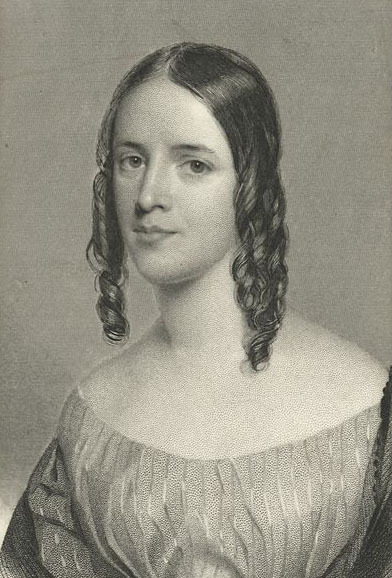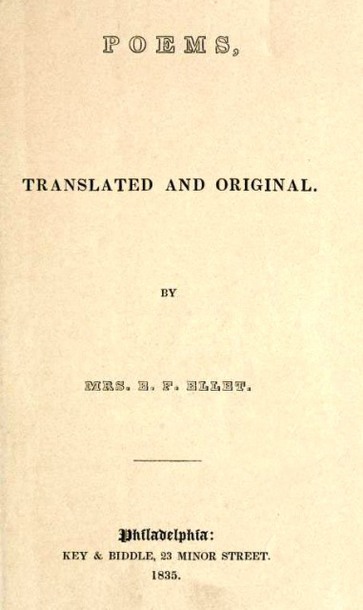ポーが書評した本 (9) エレット夫人の『詩集』 (1835) Books Reviewed by Poe (9): _Poems, Translated and Original_ by Mrs. E. F. Ellet [ポーの書評 Poe's Book Reviews]
Poems, Translated and Original. By Mrs. E. F. Ellet. Philadelphia: Key and Biddle. 1835. xii+229pp.
E・F・エレット夫人 『詩集――翻訳と自作』 フィラデルフィア: キー・アンド・ビドル、1835年。
E-text at Internet Archive [The Library of Congress; Sloan Foundation] <http://www.archive.org/stream/poemstranslatedo00elle#page/n7/mode/2up> / [Harvard University; Google] <http://www.archive.org/stream/poemstranslated00ellegoog#page/n10/mode/2up>
ポー の書評は、『サザン・リテラリー・メッセンジャー The Southern Literary Messenger』1836年1月号所収。41ページから68ページにかけての十のReview からなる "Critical Notices" の最初のもので、実は、1835年に出版された他の女性詩人(Mrs. L.[ydia] H.[untley] Sigourney, 1791-1865 と Miss [Hannah Flagg] Gould, 1789-1865 の詩集も合わせて俎上にのせています。
冒頭でポーが説明しているように、57篇の詩のうちオリジナルは39で、あとはフランス、スペイン、イタリア、ドイツ語からの英訳の詩。忠実な訳だとポーはほめています。
ポーが終わり近くでとりあげている、最後 (pp. 137-229) におさめられた『 テレーザ・コンタリーニ――悲劇』は5幕からなる劇詩で、1835年3月にパーク・シアターで上演されて好評だったけれど、自分はステージよりもクロゼットに適すると言うにとどめたい、とかポーは書いています。別の文章では「金のためだけに間に合わせで書いたようなものだ」と酷評しています。

Elizabeth Fries Lummis Ellet (1818-77)
image via Wikipedia <http://en.wikipedia.org/wiki/Elizabeth_F._Ellet>
エレット Mrs. E.[lizabeth] F.[ries] Ellet, 1818-77 は 1809年1月19日生れのポーの10歳近い年下の女性で、ポーの人生を彩った女性たちのひとりでした。エレットは詩人で評論家で、ニューヨークのいわゆるブルーストッキング(青鞜派)の女性文学者でした。ポーに恋心を抱きますが、、ポーが彼女の気持ちを拒絶して彼女からの情熱的な一連の手紙を返したときに、愛は憎しみに変わります。晩年のポーによるエレット評は、二人の関係を激しく物語っています――「あらゆる悪鬼のなかで最も悪意があり有害なもの――その忌まわしい恋心を軽蔑とともに拒む以外自分にはできなかった女 The most malignant and pertinacious of all fiends―a woman whose loathsome love I could do nothing but repel with scorn」。ちなみにポーがいとこのヴァージニア (1822-47) と結婚するのは1836年3月のことですが、1847年の妻の病没の数年前から、ポーの女性関係はなかなか複雑な様相を呈することになります(エレットの場合は1845年に南部に夫を残してニューヨーク市で文筆活動をするようになり、そこで直接にポーやマーガレット・フラーらと交流するようになるのでした)。
//////////////////////////////////////////////////////////
Zinzendorff, and other Poems. By Mrs. L. H. Sigourney, New York: Published by Leavitt, Lord & Co. 1836.
Poems — By Miss H. F. Gould, Third Edition. Boston: Hilliard, Gray & Co. 1835.
Poems; Translated and Original.
By Mrs. E. F. Ellet.
Philadelphia:
Key and Biddle. 1835.
[Mrs. Ellet]
Many but not all of the poems in Mrs. Ellet's volume, likewise, have been printed before—appearing, within the last two years, in different periodicals. The whole number of pieces now published is fifty seven. Of these thirty-nine are original. The rest are translations from the French of Alphonse de Lamartine and Beranger—from the Spanish of Quevedo and Yriarte—from the Italian of Ugo Foscolo, Alfieri, Fulvio Testi, Pindemonte, and Saverio Bettinelli, —and from the German of Schiller. As evidences of the lady's acquaintance with the modern languages, these translations are very creditable to her. Where we have had opportunities of testing the fidelity of her versions by reference to the originals, we have always found reason to be satisfied with her performances. A too scrupulous adherence to the text is certainly not one of her faults—nor can we yet justly call her, in regard to the spirit of her authors, a latitudinarian. We wish, however, to say that, in fully developing the meaning of her originals, she has too frequently neglected their poetical characters. Let us refer to the lady's translation of the Swallows. We have no hesitation in saying, that not the slightest conception of Pierre Jean de Beranger, can be obtained by the perusal of the lines at page 112, of the volume now before us.
Bring me, I pray—an
exile sad—
Some token of that valley bright,
Where in my sheltered childhood glad,
The future was a dream of light.
Beside the gentle stream, where swell
Its waves beneath the lilac tree,
Ye saw the cot I love so well—
And speak ye of that home to me?
We have no fault to find with these verses in themselves—as specimens of the manner of the French chansonnier, we have no patience with them. What we have quoted, is the second stanza of the song. Our remarks, here, with some little modification, would apply to the Sepulchres of Foscolo, especially to the passage commencing
Yes—Pindemonte!
The aspiring soul is
fired to lofty deeds
By great men's monuments, &c.
They would apply, also, with somewhat less force, to Lamartine's Loss of the Anio, in the original of which by the way, we cannot perceive the lines answering to Mrs. E's verses.
All that obscures thy
sovereign majesty
Degrades our glory in degrading thee.
Quevedo's Sonnet Rome in Ruins, we happen to have by us at this moment. The translation in this instance is faultless, and combines, happily, a close approximation to the meaning of the original, with its quaint air and pompous rhythm. The Sonnet itself is a plagiarism entire, from Girolamo Preti. The opening lines of Quevedo,
Pilgrim! in vain thou
seekest in Rome for Rome!
Alas! the Queen of nations is no more!
Dust are her towers, that proudly frowned of yore,
And her stern hills themselves have built their tomb,
are little else than the
Roma in Roma non è
In se
stessa cadeo morta e sepolta, &c.
of Girolamo. But this is no concern of Mrs. Ellet's.
Of the original poems, which form the greater part of the volume, we have hardly been able to form an opinion, during the cursory perusal we have given them. Some of them have merit. Some we think unworthy of the talents which their author has undoubtedly displayed. The epigram, for example, at page 102 is rather a silly joke upon a threadbare theme, and, however well it might have suited Mrs. Ellet's purpose to indite it, she should have had more discretion than to give it permanency in a collection of her poems.
Echo was once a love
sick maid
They say: the tale is no deceiver.
However a woman's form might fade
Her voice would be the last to leave her!
The tragedy (Teresa Contarini) at the end of the volume, "is founded," says the authoress, "upon an incident well known in the history of Venice, which has formed the material for various works of fiction." Mrs. E. has availed herself of a drama of Nicolini's in part of the first scene of the first act, and in the commencement of the fifth act. The resemblance between the two plays is, however, very slight. In plot—in the spirit of the dialogue—and in the range of incidents they differ altogether. Teresa Contarini was received with approbation at the Park Theatre in March 1835, —Miss Philips performing the heroine. We must confine ourselves to the simple remark, that the drama appears to us better suited to the closet than the stage.
In evidence that Mrs.
Ellet is a poetess of no ordinary rank, we
extract,
from page 51 of her volume, a little poem rich in vigorous expression,
and full of solemn thought. Its chief merits, however, are condensation
and energy.
Hark—to the midnight
bell!
The solemn peal rolls on
That tells us, with an iron tongue,
Another year is gone!
Gone with its hopes, its mockeries, and its fears,
To the dim rest which wraps our former years.
Gray pilgrim to the
past!
We will not bid thee stay;
For joys of youth and passion's plaint
Thou bear'st alike away.
Alike the tones of mirth, and sorrow's swell
Gather to hymn thy parting. —Fare thee well!
Fill high the cup—and
drink
To Time's unwearied sweep!
He claims a parting pledge from us—
And let the draught be deep!
We may not shadow moments fleet as this,
With tales of baffled hopes, or vanished bliss.
No comrade's voice is
here,
That could not tell of grief—
Fill up! —We know that friendship's hours,
Like their own joys—are brief.
Drink to their brightness while they yet may last,
And drown in song the memory of the past!
The winter's leafless
bough
In sunshine yet shall bloom;
And hearts that sink in sadness now
Ere long dismiss their gloom.
Peace to the sorrowing! Let our goblets flow,
In red wine mantling, for the tears of wo!
Once more! A welcoming
strain!
A solemn sound—yet sweet!
While life is ours, Time's onward steps
In gladness will we greet!
Fill high the cup! What prophet lips may tell
Where we shall bid another year farewell!
With this extract, we close our observations on the writings of Mrs. Ellet—of Miss Gould—and of Mrs. Sigourney. The time may never arrive again, when we shall be called upon, by the circumstances of publication, to speak of them in connexion with one another. [Southern Literary Messenger, January 1836]




